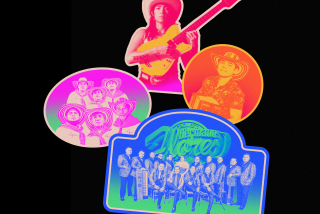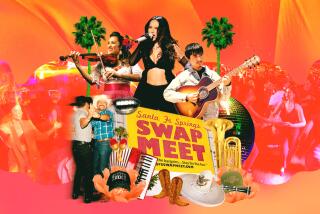Harmonic Convergence
With the Mana-Santana show packing the Arrowhead Pond of Anaheim for four nights and the Watcha Tour blazing through the Greek Theatre last week, the profile of rock en espanol has never been higher. Both events underscore how the music’s crossover into the mainstream has translated into bigger venues filled with boisterous, predominantly younger audiences.
But what about pre-rock music en espanol?
The traditional folk music of Mexico and Latin America has a smaller yet fiercely loyal following, particularly in South County.
Culturally rich folkloric music from Mexico, Venezuela and Argentina is on tap tonight in San Juan Capistrano with Correo Aereo, an Austin, Texas-based duo featuring singer-multi-instrumentalists Abel Rocha and Madeleine Sosin.
Born and reared in Mexico, Rocha was a boy when he learned to play huapango music from his uncle and father. As a teenager, he was drawn to Andean folk music, learning mestizo and criollo rhythms, which include a blend of Indian, African and European influences.
Rocha went on to study at Mexico City’s Anthropological University, specializing in musical forms native to the Michoacan and La Huesteca regions. He also learned the music of the Venezuelan plains from Manual Diaz, a much-admired Venezuelan musician and anthropologist.
While with the group Quetzalcoatl, which he formed in 1987, Rocha met Sosin during a tour stop in 1991 in Santa Fe, N.M. A musical and romantic partnership quickly blossomed, with Rocha leaving Quetzalcoatl to form Correo Aereo (Spanish for “air mail”) with Sosin. They got married, toured the United States and Mexico, and released their debut album, “Provinces,” in 1992.
Correo Aereo’s musical menu includes huapangos, the traditional folk songs from Mexico’s Huasteca region; joropos, golpes and merengues of the Venezuelan countryside; and the dance-oriented zambas and other of Argentina, which feature lilting melodies and the duo’s distinctive harmony blend. Sosin plays the violin, maracas and other percussive instruments, while Rocha plays the Venezuelan and Mexican harps, acoustic guitar, cuatro and quinta huapanguera (large four- and five-stringed guitars).
In 1993, Correo Aereo moved to Austin after a well-received performance at that city’s South by Southwest (SXSW) World Music Showdown led to regular gigs at nearby venues. For Sosin, who studied violin at California Institute of the Arts in Santa Clarita, playing alongside Rocha has broadened her skills and perspective immensely.
“I had played some music from Brazil and Africa, but I had never heard these particular styles of music before I met Abel,” she said by phone from her home in Austin. “When I saw him pull the harp out and play so polyrhythmically--and with such beauty and grace--it was an incredible awakening for me.
“I’m not Mexican, Venezuelan or Argentinian,” she said, “but I think with my genetic makeup--I’m part Spanish Gypsy through my mother’s side--you can hear some of the cultural connections.”
*
The twosome caught a break after one of their weekly restaurant gigs during last year’s SXSW festival. Among the impressed patrons were Joey Burns and John Convertino of the indie rock group Calexico, who subsequently invited Rocha and Sosin to open for them on a European tour, which they have just finished.
“After these California dates, we’re heading out to their studio in Tucson to musically experiment with them,” Sosin said. “It could lead to a recording project--we just don’t know at this time. But we’re very excited about it.”
While sharing a respect for their music’s heritage, the duo also aims to push the songs forward.
“I see what we’re doing as part of lineage, kind of a tree with many branches that reach out,” said Rocha, taking a turn on the phone. “We put our own spin on the material, but maybe somewhere down the road, somebody else will add something different. Huapangos are a little like jazz standards . . . they’re meant to be played and sung differently each time.”
*
Sosin said this music, much of it springing from adversity, can be a source for healing.
“The seeds to this music were sown back in the [Spanish] colonial era . . . just an ugly period of suffering and slavery,” she said. “I think this music originally gave a voice to those who were forgotten or neglected. I hope our contributions work as a bridge to make people realize how connected we all really are.”
The music’s power to unite also has been felt on a more personal level by Sosin and Rocha, whose working relationship has endured despite their divorce in 1994.
“Abel and I have triumphed because our love for each other is all about how we play music together,” Sosin said. “We’re still artistically married and very good friends. . . . We still have a life partnership--it’s just not what we thought it was originally.
“Music is ephemeral . . . it just keeps vibrating,” she added. “There is a certain spark and intimacy that exists when Abel and I perform together. Maybe making music is just how we were meant to make love.”
* Correo Aereo plays tonight at the San Juan Capistrano Regional Library, 31495 El Camino Real. 7 and 9 p.m. $3-$6 (949) 248-7469.
More to Read
The biggest entertainment stories
Get our big stories about Hollywood, film, television, music, arts, culture and more right in your inbox as soon as they publish.
You may occasionally receive promotional content from the Los Angeles Times.










